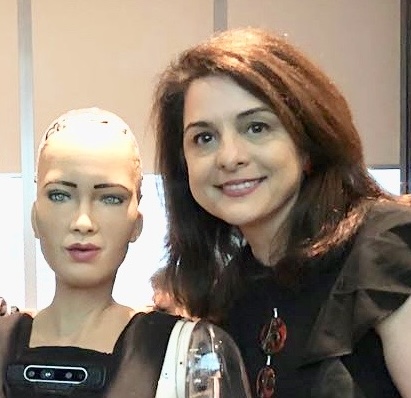How public media can help shape ethical AI voice technology

Mike Janssen, using DALL-E 3
The recent news of OpenAI suspending its “Sky” voice after actor Scarlett Johansson threatened legal action has sparked significant concerns within the AI industry and around the world. In a statement Monday, Johansson expressed shock and anger that OpenAI “would pursue a voice that sounded so eerily similar to mine that my closest friends and news outlets could not tell the difference.”
At my company TulipAI, we have been producing trainings on audio innovation for journalists, examining the ethical considerations of AI voices. Importantly, we created a three-part podcast to test AI tools’ capabilities in research, engagement and voice.
Coincidentally, I used the Sky voice as my co-host. However, because of ethical considerations, we have decided to re-record our conversation using a different AI voice.
I want to be transparent about this. I came to this decision after discussing it with Mike Janssen, Current’s digital editor. I was working with him on a feature when the news broke of Johansson’s response to OpenAI.
This incident underscores the crucial need for transparency and ethical considerations in AI voice technology. It is even more important to test the tools out there, learn from them and understand their ethical guidelines, and then balance the vital option of creating proprietary technology. For example, the Washington Post announced a partnership with Virginia Tech to build proprietary AI technology. Public media companies can create partnerships with universities to develop AI tech that speaks to their needs and communities.
We must advocate for the rights of voice actors and ensure that AI advancements align with principles of transparency and fairness. AI, like the printing press and the internet before it, is impacting the way we share information. Our goal must be to build tools that resonate with our audiences, are imbued with cultural richness, and represent all people while preserving cultural and traditional knowledge.
I’ve engaged in several innovative collaborations to explore the intersection of humans and technology. First, I teamed up with Sophia the Robot to delve into human-machine relationships. Then, I developed Sina the Storyteller, an AI initiative aimed at preserving cultural heritage. Lastly, I co-hosted a podcast with the Sky voice to assess its capabilities before opting for a different voice given the ethical concerns.

In 2018, I worked with Sophia the Robot in my role as managing editor for Hanson Robotics. My role was to bring in a writing team who would work with the engineers in designing Sophia’s conversations.
Sophia’s role was to be a robot cultural icon, allowing us to explore the future of human-robot relationships. Her public appearances and media engagements sparked discussions about ethical AI development, the importance of compassion and empathy in robotics, and the societal impact of humanoid robots.
David Hanson, who created Sophia, had a vision of social robots as benevolent guides. This highlights the need for ethical considerations in AI as we aim to create machines that enhance human experiences while addressing complex technological challenges. At the time, Sophia represented both the potential and the ethical dilemmas of integrating advanced robotics into everyday life.
Reflecting on this experience, I see that our relationship with machines will grow and thrive if we nurture them with history and cultural wisdom. It’s not enough to feed them large datasets; machines must also understand intangible cultural heritage contexts. We must forge partnerships with our communities and universities to effectively train AI on relevant historical contexts. This will ensure that AI systems serve us meaningfully and effectively in public media.
In 2019, I created Sina the Storyteller with my former team at IVOW AI. Sina was a storytelling chatbot with a unique appreciation for global cultures. Designed to learn about vibrant food cultures from around the world, Sina was built on the Google Assistant Platform, which no longer exists. This experience before the advent of generative AI highlighted the potential and challenges of integrating technology with cultural storytelling.
As journalists, we have a responsibility to engage with and shape the development of AI technologies. By experimenting with these tools, we can ensure they serve the public interest responsibly.
Our team at TulipAI has extensively researched various AI voice technologies, finding ElevenLabs exemplary in its ethical approach. It uses advanced AI and deep-learning models to generate lifelike synthetic voices, focusing on replicating natural speech’s nuances, intonations and characteristics. Its transparency about data sources and prioritization of ethical considerations set a standard that other companies should follow, ensuring responsible AI development.
Reflecting on our role
We can’t shy away from experimentation; we must respond based on community feedback. Our role is akin to that of a weaver on a loom, where each thread represents a different voice, perspective and cultural nuance. By weaving these threads together, we create a rich tapestry that reflects our communities’ diverse stories and experiences.
In our inaugural podcast AI and Media Insights, we explore various aspects of AI in media, including the ethical use of AI voices and their potential to impact content creation. While AI voice technologies hold great potential, we must navigate these waters carefully, committed to ethical practices and respect for intellectual property rights. The journey ahead requires a collaborative effort to establish robust ethical guidelines that protect all stakeholders in the AI ecosystem.
Public media occupies a unique position among media outlets, serving as a community-focused alternative. This role comes with the responsibility to represent and amplify community voices fairly and accurately, especially in an era increasingly dominated by digital and AI technologies.
Public media can lead by example by adopting open-source voice and data technology, ensuring transparency and fairness in the development and application of AI technologies. Open-source software, characterized by its freely accessible and modifiable source code, facilitates community collaboration, enhances innovation and improves software reliability through peer reviews. By committing to open source, public media ensures that all future member stations operate under these principles.
This approach sets a high standard for accountability and community engagement, accelerating technological advancements that truly serve the public interest. By being proactive and bold, public media guarantees that AI technologies developed and used by stations reflect the diverse voices of our communities, thereby fostering a more inclusive digital future.
Leveraging my deep-rooted experience in public media, with tenures at KUNM and NPR, I appreciate the critical function of public media as a voice for diverse communities. This perspective shaped an initiative I directed in September 2021 in Arizona.
Collaborating with Native American technologists and engineers at the American Indian Science and Engineering Society meeting in Phoenix, our objective was to emphasize the importance of ensuring AI systems accurately and ethically tag cultural content. This effort aimed to enhance understanding among Native American technologists about the significant role of AI in respecting and preserving cultural integrity and how open-source AI technologies can empower communities by allowing them to contribute their own culturally significant data, which in turn enhances the accuracy and ethical handling of such content.
The workshop emphasized the experiential learning methods of Indigenous cultures and fostered a collaborative environment where elders and youth could share their narratives and perspectives, ensuring that AI systems better represent and understand the diverse tapestry of indigenous cultures. Additionally, we discussed the need to strategize on compensation to create a more equitable and practical data economy around AI.
The event also highlighted the importance of culturally sensitive data, emphasizing that before AI can effectively utilize voice technologies that resonate on a personal level, it must first be adept at recognizing and valuing the vast array of cultural narratives. The workshop underscored the necessity for AI systems to comprehend the complex tapestry of Indigenous cultures, which is crucial for developing AI voices that are both authentic and respectful.
The core activity involved a workshop that aimed to demonstrate how AI can be taught about Indigenous heritage through storytelling and tagging culturally significant images. This initiative not only educated participants about the importance of culturally sensitive data but also highlighted the need to incorporate Indigenous wisdom into AI training datasets.
Given that many AI systems have been taught using text and images, we explored an image that featured pupils at the Carlisle Indian Industrial School in Pennsylvania. Founded in 1879 by the U.S. government, the Carlisle School was part of a larger federally funded effort to ethnically cleanse and culturally assimilate Native Americans.
Our student participants expressed that no robot or automation tool would be able to sense the sentiment that arises from such an image. The tags the students chose for this image included sadness, tragedy, cultural elimination, whitewash, genocide, Native children, but also resiliency.
The Phoenix workshop highlighted the potential to democratize AI development, making it a participatory and transparent process where community input leads to better, more culturally sensitive technologies. By engaging directly with communities in the creation of datasets and AI voices, we avoid relying on third-party providers whose ethical standards may not align with our own, as seen in the OpenAI controversy.
I can’t underscore enough the need for AI systems to comprehend the complex tapestry of our communities, which is crucial for developing AI voices that are both authentic and respectful. By doing so, we ensure that the voices we use in AI are created with a clear understanding and respect for the ethical implications involved, fostering trust and integrity in AI applications. This holistic approach not only enhances the quality and inclusivity of AI voices but also mitigates the risks of depending on third-party voice technology, while economically benefiting contributing communities.
At a time when public media is grappling with layoffs and uncertainty, it needs a new focus, a North Star and a reason to believe it has a role in the future of automation. Our leadership in ethical AI innovation helps us carve out a significant place in media, ensuring that the tools we develop serve and reflect our diverse communities accurately and respectfully.
Davar Ardalan is an AI and Media Specialist known for her leadership in Cultural AI initiatives. With experience at National Geographic, NPR News, The White House Presidential Innovation Fellowship Program, IVOW AI and TulipAI, she has championed principles like fairness and cultural preservation in AI. Ardalan has also developed AI training and educational workshops. As the leader of TulipAI, she focuses on AI and cultural heritage preservation. She serves as a Webby Award Judge for AI and is researching a book on AI and community, underscoring the importance of harnessing AI not only for innovation but also for fostering stronger, more connected communities.
This content was created with the help of artificial intelligence, which helped organize the narrative, check grammar, and summarize important information to improve clarity and flow.






